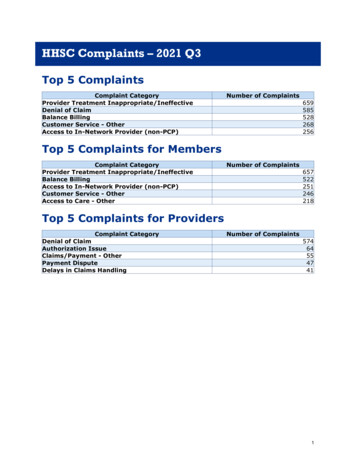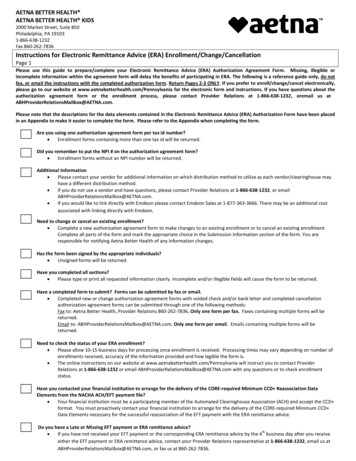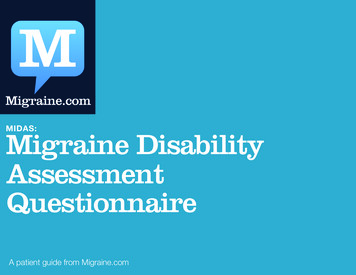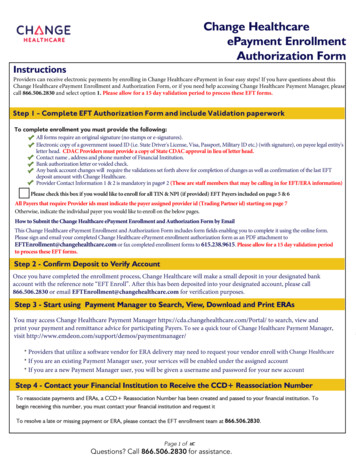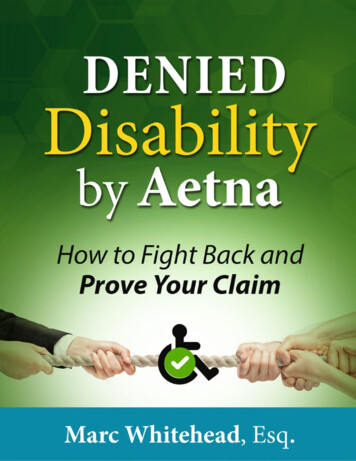
Transcription
Denied Disability by Aetna: How to Fight Back and Prove Your ClaimNeed insight into your Aetna claim?Call Marc Whitehead & Associates, Attorneys at Law, LLP at 800.562.9830,or learn more at www.DisabilityDenials.com.
Denied Disability by Aetna: How to Fight Back and Prove Your ClaimIntroductionYou willlearn howand whyto proveyour Aetnaclaim.Life and business are fundamentally unpredictable. However, when webecome ill or hurt, we depend on our support systems to protect ourneeds and treat us fairly and with respect. Whether you injured yourback in a sudden work accident or slowly developed a debilitatingcondition, such as chronic fatigue, fibromyalgia or a motor or nervedisorder, you are no longer able to work and live your life with ease.These restrictions have made it hard, if not impossible, to earn a fairwage. Complicating the picture, you’re struggling to get fair treatmentfrom your long term disability insurance company, Aetna.This short ebook explains and demystifies long term disability denials.It offers strategic insight into how to approach your case effectively, sothat you can obtain a fair outcome, respond the right way, and regainpeace of mind.Need insight into your Aetna claim?Call Marc Whitehead & Associates, Attorneys at Law, LLP at 800.562.9830,or learn more at www.DisabilityDenials.com.
Denied Disability by Aetna: How to Fight Back and Prove Your ClaimHere’s asynopsis ofwhat we willdiscuss:1. The History of Aetna2. What You Should Know about the Disability InsuranceIndustry3. Understanding Your Disability Coverages4. How Much Will Your Disability Check Be?5. Pre-Existing Conditions Could Impact Your Benefits6. The Appeals Process Varies for Individual and Group LTDPolicies7. Nine Ways to Improve Your Chances of Receiving DisabilityBenefits8. Winning Approval of Your Disability Claim9. Filing an Administrative Appeal After Your Claim Is Denied10. Residual Functional Capacity (RFC): How Aetna DecidesWhat Jobs You Could Do11. What Aetna May Do to Try to Deny Your Claim12. Lose Your Administrative Appeal? How to File a Lawsuit.13. Four Ways to Find a Qualified ERISA Attorney14. Summary: How to Handle a Disability Claim with AetnaNeed insight into your Aetna claim?Call Marc Whitehead & Associates, Attorneys at Law, LLP at 800.562.9830,or learn more at www.DisabilityDenials.com.
Denied Disability by Aetna: How to Fight Back and Prove Your Claim1. The Historyof AetnaAetnaTimeline1868 – Introduced firstrenewable term life policies1913 – Aetna introducedgroup life insurance1916 – Aetna was largestmultiline insurance companyin the U.S.1919 – Aetna introducedgroup disability policies1967 – Company reorganized1991 – Company narrowedinsurance lines1996 – Aetna merged with U.S.HealthcareToday – Aetna continues toevolve from an insurancecarrier to health company.After losing control of the first insurance company they started(Connecticut Mutual Life Insurance), Eliphalet Bulkeley and a groupof businessmen in Hartford, Connecticut, tried again. In 1853, theystarted Aetna Life Insurance as a spinoff of Aetna Fire Insurance,which had been founded in 1819. (The fire insurer had adopted itsname as a way to invoke the active Mount Etna volcano.)The company grew through the 1860s, fueled by increased buyingof life insurance policies due to the Civil War and by its innovativeproducts. For example, Aetna introduced the first renewable termlife policies in 1868. From the 1890s through the first decade of the20th century, Aetna added accident, health, workers compensationand auto and property insurance to its offerings. Aetna was one of the first companies to write group coverageinsurance for business. It introduced group life insurance in 1913and group disability policies in 1919. Three years later, it was thelargest multiline insurance company in the U.S.Despite an overexpansion of its automobile insurance and othernon-life lines, Aetna did manage to survive the Great Depression bylimiting its underwriting and building up its reserves. Aetna entered the group market--life, health and accident-after World War II. A re-organization in 1967 produced a holdingcompany, Aetna Life and Casualty, and several subsidiarycompanies.From the 1960s until the late 1980s, Aetna continued to expand ata fast pace, entering many new markets and expanding services.In 1991--after a bust in the economy--the company narrowed itsinsurance lines, withdrawing from the auto insurance market. It alsostopped selling individual health care policies.By 1995, the health care business accounted for 60 percent ofAetna’s sales. The company restructured again in the late 1990s,selling off its property/casualty lines, individual life insurancebusiness, and behavioral managed care business. In 1996, Aetnamerged with U.S. Healthcare.Need insight into your Aetna claim?Call Marc Whitehead & Associates, Attorneys at Law, LLP at 800.562.9830,or learn more at www.DisabilityDenials.com.
Denied Disability by Aetna: How to Fight Back and Prove Your ClaimBy 1995, the healthcare businessaccounted for 60%of Aetna’s sales. In 1998, several hundred dissatisfied doctors in Texas andtwo other states left the Aetna system. Consumers also complainedabout Aetna’s refusal to cover some treatments. Dissatisfaction with Aetna’s policies continued to grow untilthe company signed an agreement to end a lawsuit brought againstit by more than 700,000 physicians and medical societies. Aetnapledged to improve communications with providers, to reduceadministrative complexity, and to improve the quality of its healthcare system.Throughout the 2000s, Aetna continued to acquire new healthrelated companies, including the disability and leave managementbusiness of Broadspire, which provided claims managementservices. It is continuing to evolve from an insurance carrier to ahealth company.CASE STUDY #1: Stephens v. Aetna Life Insurance Company (United StatesDistrict Court for the Southern District of Ohio, Western Division); Decided July 9,2012Plaintiff James Stephens hurt his back in May 2004 while trying to lift an 80 pound mold at work for PaxarCorporation. His slip and fall led to a herniated disc and strain in his lumbar area. He went back to work afterrehabilitating but ultimately had to stop working in June 2004 because of the back pain.Stephens had participated in his employer’s Aetna plan, which was supposed to pay disability benefits.However, Aetna’s plan administrator decided that Stephens was not disabled, per the insurer’s long termdisability plan requirements. Stephens responded by filing a claim pursuant to the Employee RetirementIncome Security Act (ERISA), claiming that the administrator’s decision was “arbitrary and capricious becauseit was not the product of a deliberate principled reasoning process and because it was not supported bysubstantial evidence.”The court agreed, granting his motion for judgment on the administrative record, remanding the case toAetna to do a proper review of the evidence, saying “it was clearly unreasonable for the reviewer to interpreta physician’s statement that plaintiff was limited to a sedentary lifestyle as a recommendation that plaintiffcould perform sedentary work, and the reviewer overlooked or ignored evidence showing the plaintiff had alumbar disc herniation.”Need insight into your Aetna claim?Call Marc Whitehead & Associates, Attorneys at Law, LLP at 800.562.9830,or learn more at www.DisabilityDenials.com.
Denied Disability by Aetna: How to Fight Back and Prove Your Claim2. What YouShould Knowabout theDisabilityInsuranceIndustryWhen insurers came up with the idea of disability insurance about 30years ago, they thought it would be a good source of revenue. Whowouldn’t want to sign up for a policy—either individually or throughan employer—that would offer income protection if they becamedisabled and couldn’t work at their regular jobs?However, just a few years after they started selling these policies,insurers realized they were in trouble. As people got older andsuffered more medical problems, they made more claims undertheir disability coverage. New premiums weren’t covering insurers’outlays for disability payments.During the booming stock market of the 1990s, other profitableinvestments helped insurance companies cover their disability policylosses. But when the market hit a downturn, they started looking forother ways to make the disability market profitable. Their solutionwas to deny disability claims by searching for every loophole toget out of making payments, to reduce benefits and/or to cut offpayments as soon as possible.This approach has had a negative impact on many people whohave become disabled and who thought they had good disabilitycoverage. Instead of receiving the benefits that they expected (andthat they had paid for, often for years) they watched their claimsget denied. Unable to pay their basic living expenses (e.g. rent,mortgage, utility bills, auto payments), they suffered real financialhardships.Working with an attorney who understands the disability systemis your best hope for fair treatment.The lawyers employed by the insurance companies know every trickfor denying claims under the administrative appeal process. That’swhy you need a knowledgeable, experienced attorney who canguide you through the disability application and appeals process.The Employment Retirement Security Act (ERISA), which governsgroup disability policies, has strict requirements for filing an appealof a disability claim. For your best chance of success, don’t gothrough this appeals process alone.Need insight into your Aetna claim?Call Marc Whitehead & Associates, Attorneys at Law, LLP at 800.562.9830,or learn more at www.DisabilityDenials.com.
Denied Disability by Aetna: How to Fight Back and Prove Your ClaimYou have only one chance to present your claim appeal.IMPORTANT!You cannot add any evidenceto your case once it hasgone through administrativeappeal? That’s why it’s soessential that you have everybit of necessary informationto prove your claim whenfiling an administrativeappeal.You can take an insurer to court if the company has denied yourdisability claim.Working with an attorney who knows all the ins and outs of ERISAcan ensure that your case is as strong as possible. If an insurer hasdenied your initial claim, and you’re ready to appeal, retaining anexperience attorney should improve your chances of winning thedisability benefits that you deserve.Need insight into your Aetna claim?Call Marc Whitehead & Associates, Attorneys at Law, LLP at 800.562.9830,or learn more at www.DisabilityDenials.com.
Denied Disability by Aetna: How to Fight Back and Prove Your Claim3. UnderstandingYour DisabilityCoveragesSome companiessell disability policiesthat individuals canpurchase on theirown, Aetna doesnot.Ask your employer fora copy of your policy,and read through itcarefully.Did you know?Before you can apply for LTDbenefits, you must first applyfor STD and exhaust all thosepayments.If you have disability coverage through Aetna, by definition,you’re covered under a group benefit policy through youremployer.The terms of a disability policy vary with each employer and witheach state. You’ll need to read your own policy very carefully todetermine what level of benefits you have and what proceduresyou need to follow if you’re filing a claim. Ask your employer for acopy of your policy, and read through it carefully.Here’s an overview of the three different types of disabilitycoverage.Short term disability (STD) pays some percentage of your salaryor weekly pay, usually for a few weeks or a few months. Sinceyour employer (and not the insurer) will be covering the expenseof STD, you’ll probably find it easier to obtain these benefits.Gaining approval for long term disability (LTD) is harder,because the insurer—in this case Aetna—must pay your benefit.It doesn’t matter if you and your employer know that your injuryor illness will make it impossible for you to do your job any more.You still have to go through these steps.Like STD benefits, LTD payments will only cover a part of yourregular paycheck, and the benefits usually last only 24 months. Toqualify, you have to meet the “own occupation rule,” which meansthat you won’t be able to do your own job during that time.However, if your injury or illness will prevent you from returning towork after two years, you may qualify for benefits until you reachage 65.Catastrophic coverage kicks in when your disability is so severethat you need help to perform even the simple tasks of life eachday. In this case, you’d qualify for a home health aide or a similarhelper to assist you with bathing, dressing and eating.Need insight into your Aetna claim?Call Marc Whitehead & Associates, Attorneys at Law, LLP at 800.562.9830,or learn more at www.DisabilityDenials.com.
Denied Disability by Aetna: How to Fight Back and Prove Your Claim4. How Much WillYour DisabilityCheck Be?Offsets reduce your disability checksOffsets are other payments that reduce your disability paymentsfrom Aetna. For example, if you were injured while on the job,you might be eligible for benefits under Workers CompensationInsurance. You might be able to receive retirement benefits,retirement disability benefits, federal disability benefits (e.g.Social Security Disability) and/or state disability payments. Youcould win a settlement in a lawsuit related to your injury.Aetna will reduce your disability payments by the amount ofmoney you receive from any and all of these other sources.Even if you can’t carry out your normal work responsibilities dueto your disability, your employer might try to find another job thatyou can do. If the wages you receive in this new position are 20percent lower than what your usual paycheck position would be,Aetna might pay you a residual or partial disability benefit.Although STD and LTD paymentsvary according to your policy,you can usually expect toreceive about 60 percent of yournormal paycheck. Aetna alsouses a formula for determiningbenefits for those who work oncommission.tIf all of these offset payments total to an amount greater than thebenefit you’d be entitled to under your disability policy, Aetnastill has to make a minimal payout. You’re entitled to 100 or 10percent of the full disability the insurer would usually have to pay.Watch out for overpaymentsUnder the terms of most disability policies, you have to applyfor Social Security Disability benefits when you apply for LTD.However, it can take a long time before you find out if you qualifyfor SSD; the government reviews each claim very carefully. In themeantime, Aetna will be sending you a disability check. So whathappens if SSD approves your claim?When you finally receive your SSD checks (and they shouldinclude back payments from the time you filed), Aetna will expectrepayment of the total amount that you have received from SSD.Unfortunately, many people have already spent this money tryingto keep up with their bills.Need insight into your Aetna claim?Call Marc Whitehead & Associates, Attorneys at Law, LLP at 800.562.9830,or learn more at www.DisabilityDenials.com.
Denied Disability by Aetna: How to Fight Back and Prove Your ClaimIf you don’t want to be faced with the prospect of paying Aetna back, you can ask the insurance company towithhold from your disability check the amount that they expect SSD will pay you.It’s very important to understand all of these offsets, so that you will not be surprised by Aetna’s demandsfor repayment when other disability income sources start providing benefits to you.CASE STUDY #2: Berkoben v. Aetna Life Insurance Company (United StatesDistrict Court for the Western District of Ohio, Western Division);Decided February 21, 2014Jason Berkoben had been working for Dell, Inc. as a computer programmer for three yearsbefore developing Schizoaffective Disorder and Bipolar Disorder in 2010. These issues forcedhim to stop working in March 2010, and his psychiatrist, Dr. Lekhwani advised him to stay homefrom work because of the mental illness.Aetna approved 180 days of short term disability and then approved long term disability startingon August 29, 2010. Aetna never questioned Berkoben’s diagnosis; from August 2010 throughJune 2012, Dr. Mary Galonski treated him and “consistently opined” that his SchizoaffectiveDisorder made it impossible for him to work. Berkoben used psychotherapy along withmedications such as Lithium, Risperal and Zyprexa to get control of his symptoms, which includeddepression, suicidal ideation, anxious thoughts and hallucinations.Nevertheless, Aetna made a decision to terminate his long term disability benefits. Berkobenthen filed suit, and the court granted his Motion for Summary Judgment in part, recommendingthat “Aetna’s decision to terminate Plaintiff’s long term disability benefits be vacated and thecase remanded to the plan administrator for further consideration in light of this Report andRecommendation.”Need insight into your Aetna claim?Call Marc Whitehead & Associates, Attorneys at Law, LLP at 800.562.9830,or learn more at www.DisabilityDenials.com.
Denied Disability by Aetna: How to Fight Back and Prove Your Claim5. Pre-ExistingConditionsCould ImpactYour BenefitsInsurers may try tomake a connectionbetween yourdisability and thepre-existing illness orcondition, even if onedoesn’t exist.If you’ve had a condition or an illness any time in the 12 monthsbefore you apply for long term disability, Aetna might try to denyyou benefits based on the pre-existing condition clause. Sometimesthe company will even look at any health problems you’ve hadextending back three years.For example: Suppose you applied for disability because you injured yourback when you were working. Aetna might look back over yourmedical records for the past year and discover you were on painmedicine a few months before. Even if you argue that the medicinewas for a wrist injury you suffered while playing sports, Aetna mightargue that the fact you were taking medication indicated that youwere actually having back problems long before you applied for LTD.Based on this reasoning, the insurer will try to deny your LTD claim. Feeling depressed because you’re getting behind in yourbills due to your disability? If your doctor gives you medication tohelp you through this difficult time, the insurer may try to stop yourdisability payments, justifying the decision by arguing that yourproblem isn’t physical, but psychological in nature. If you’re having trouble concentrating because of theprescription medicine your doctor prescribed to alleviate pain froman injury, the insurance company may try to stop paying LTD benefitsafter 24 months. They’ll claim that your impairment is mental, notphysical.Need insight into your Aetna claim?Call Marc Whitehead & Associates, Attorneys at Law, LLP at 800.562.9830,or learn more at www.DisabilityDenials.com.
Denied Disability by Aetna: How to Fight Back and Prove Your ClaimSymptoms can be difficult to proveIt can be difficult enough to qualify for disability benefits whenyou have an illness or injury that your physician can document withMRIs, X-rays and blood tests. What if you have an illness like chronicfatigue syndrome, which is a legitimate problem but which can’tbe diagnosed with a lab test? Physicians must rely solely on thesymptoms that you describe to them.Insurers, convinced that many claimants strive to take unfairadvantage of the disability system, often ignore patients’descriptions of their symptoms. Aetna might claim, for instance,that an illness is really a mental health issue, and could deny yourapplication for LTD benefits or try to discontinue them after 24months.Need insight into your Aetna claim?Call Marc Whitehead & Associates, Attorneys at Law, LLP at 800.562.9830,or learn more at www.DisabilityDenials.com.
Denied Disability by Aetna: How to Fight Back and Prove Your ClaimSTUDY #4: Holoubekv. UnumLife InsuranceCompanyAlthoughAetna doesn’tsell individualdisability policies, if you6.CASEAppealshad purchased such a policy from another carrier, the laws of theProcess Varies state where you live would govern your appeals process. Once thecarrier denied your appeal, you would be able to file suit in a statefor Individual court. You could ask for a jury trial if you desire, where you couldand Group LTD present all your evidence, including any new evidence that you hadgathered after the appeals process. Your attorney could challengePoliciesthe insurance companies’ witnesses in court. In short, you’d have allthe rights you’d expect when taking a case to court.Those same rules do not apply when you have employer-providedgroup disability insurance through Aetna. Federal ERISA (EmployeeRetirement Income Security Act) laws govern these cases. It’s harderto make your case under ERISA, because the laws are written to favorthe insurance companies. Even if the insurance company has denied your claim for nogood reason, it won’t face any penalties; you have no way to sue fordamages under ERISA. You will receive only the benefits that theinsurer should have paid you in the first place; if you’re fortunate, thejudge will order the insurance company to pay your attorney’s fees,too. Even if your own physicians present a strong case in favorof your disability claim, insurers like Aetna don’t have to give theirtestimony any weight in making a decision about your disabilityclaim.Need insight into your Aetna claim?Call Marc Whitehead & Associates, Attorneys at Law, LLP at 800.562.9830,or learn more at www.DisabilityDenials.com.
Denied Disability by Aetna: How to Fight Back and Prove Your ClaimBefore You Can File an ERISA ClaimAccording to the ERISA regulations, you can’t file a lawsuit appealing a denial of your disability claim,unless you have taken all of the necessary steps to resolve the matter out of court including exhausting youradministrive appeals. After Aetna initially denies your claim, you must go through the company’s appeals process, makingsure to meet all deadlines. If Aetna denies your appeal, you can take the insurer to federal court. Be aware, however, thatconsumers don’t get the same protections in federal court as they receive in state courts. The assumptionunder ERISA is that the insurance company made the right decision, and you have to prove that they didnot. (In state court, by contrast, you’d only have to prove to the judge or the jury that you should receivebenefits because you really are disabled.)CASE STUDY #3: Carrier v. Aetna Life Insurance Company (United StatesDistrict Court for the Central District of California); Decided July 24, 2015Gloria Carrier began working for Bank of America in 2010 as a Credit Administrator, where her dutiesincluded supervising and coordinating loan activities. During this time, she developed uterine cancer, whichrequired extensive medical treatment and led to the development of neuropathy, which subsequently lefther very depressed. Her condition led her to take time off work, and she filed for short term disability (STD) inAugust 2011.Aetna granted her STD and shortly thereafter evaluated her eligibility for long term disability, which theinsurer granted on February 10, 2012. However, just a year later, on July 11, 2013, Aetna determined thatCarrier no longer qualified for the benefits, per Aetna’s definition of disability. Carrier subsequently appealedthe decision, and the insurer rejected the appeal to reinstate benefits on February 7, 2014. She then filed acourt action to compel a review of Aetna’s decision to terminate the benefits.The District Court found that Aetna’s administrator “improperly terminated” Carrier’s benefits “becausethe treating physician’s reports provided persuasive evidence that the participant was disabled during theapplicable time-frame [and that] the physician’s conclusions were sounder than those presented by the peerreviewers.” As such, the Court found a judgment for Carrier and remanded the action.Need insight into your Aetna claim?Call Marc Whitehead & Associates, Attorneys at Law, LLP at 800.562.9830,or learn more at www.DisabilityDenials.com.
Denied Disability by Aetna: How to Fight Back and Prove Your Claim7. Nine Waysto ImproveYour Chancesof ReceivingDisabilityBenefitsTo create the strongest possible case when you file:1. Understand what your policy says.What pre-existing conditions could disqualify you from receivingdisability benefits? Will your benefits be offset (reduced) bypayments from Workers Comp, SSD, or lawsuit awards? How longwill your STD payments last? When should you apply for LTDbenefits?2. Fill out forms accurately. Stay consistent in your answers.You may notice that the form seems to ask the same question againand again, phrased slightly differently each time. Make sure youanswer those questions consistently. Take the time to think eachquestion through, and don’t use words like “always” or “never” inyour answers.3. Focus your claim on conditions that your policy doesn’texclude.Claims that concentrate on medical issues and functional problemsare more likely to win you benefits.4. Get started on your SSD application.Aetna will require you to file for SSD within a year, so it is best to getthat application process moving as well.5. Ask your doctor to support your claim.It’s a good idea to inform your physicians that you have applied fordisability, so that they will be on the lookout for forms and lettersfrom Aetna regarding your case. Explain to your doctors why theyneed to complete and return any paperwork from Aetna promptly.Be polite.6. Provide Aetna with updated contact information for all yourdoctors.Make sure Aetna has the correct addresses and phone numbersfor each of your medical providers. That way, the companyrepresentatives won’t be able to claim they couldn’t reach yourdoctors.Need insight into your Aetna claim?Call Marc Whitehead & Associates, Attorneys at Law, LLP at 800.562.9830,or learn more at www.DisabilityDenials.com.
Denied Disability by Aetna: How to Fight Back and Prove Your Claim7. Make sure your employer’s description of your job matches your own description.Your disability claim depends in part on whether or not you can perform the requirements of your job. Onceyou’re sure your description matches your employer’s, ask your physicians to write a summary explainingwhy it’s not possible for you to do that job any longer.8. Watch out for video surveillanceAetna may hire a private investigator to take video, hoping that the videographer catches you doingsomething your disability wouldn’t allow. Aetna may also send someone unannounced to your home to talkwith you. Be advised that it’s your right to insist that the representative make an appointment and return atthat time.9. Get professional help.The process of making a claim can be filled with pitfalls; insurers don’t want to make it easy, because theydon’t want to pay benefits. Work with an attorney experienced in ERISA law before you file a claim to ensurethat you present the best possible case initially. If your claim is denied, consult with a knowledgeableattorney; your appeal could also serve as the basis for a lawsuit if you have to take the insurer to court.CASE STUDY #4: Cole v. Aetna Life Insurance Company (United StatesDistrict Court for the District of South Carolina, Rock Hill Division); DecidedJanuary 26, 2012Janice Cole worked as a nurse at Springs Memorial Hospital for 31 years prior to stopping work on June 5,2006 to go on short term disability (STD). Aetna certified her benefits from the beginning of June throughSeptember 3, 2006. Cole also applied for long term disability benefits through her Aetna plan (she wasenrolled in a plan through her employer, CHS/Community Health System, Inc.) and received notification onDecember 19, 2006 that she would, indeed, qualify for those benefits.Cole continued to collect long term disability for nearly two years, before Aetna notified her that she wouldneed to qualify as disabled per the “any occupation” standard.Cole provided updated clinical and medical records, per the insurer’s request, but Aetna still decidedto terminate the benefits on November 4, 2008, because it concluded that she failed to pass the “anyoccupation” test. She appealed.As part of the appeals process, Aetna asked Dr. Benjamin Lechner, a doctor Board Certified in InternalMedicine and Rheumatology, to conduct an independent review. Dr. Lechner determined that Cole lackeda functional impairment that would prevent her from working. Thus, Aetna upheld the termination of herdisability benefits. However, disturbingly, “the documents listed by Aetna in the letter as those that it reviewedin coming to its decision were those of another claimant rather than those pertaining to Cole.”Cole understandably went to court to remand Aetna to review her case further. The court determined thatAetna did indeed make a “procedural error,” and the court “remanded the case to the plan administrator for afull and fair review of plaintiff’s claims as required by ERISA.”Need insight into your Aetna claim?Call Marc Whitehead & Associates, Attorneys at Law, LLP at 800.562.9830,or learn more at www.DisabilityDenials.com.
Denied Disability by Aetna: How to Fight Back and Prove Your Claim8. Winning Approval of Your Disability ClaimAetna will not make it easy for you to get your disability claim approved, and the company has a great dealof control over how the process goes. It not only gets to define in your policy what a disability is; it also getsto interpret that definition.Aetna can also rely more heavily on the company’s own doctors’ descriptions of your condition. Since theinsurer offers only group LTD policies, governed by ERISA law, it does have to place “great weight” on yourown doctors’ opinions. However, that constraint doesn’t mean Aetna can’t overrule those opinions.How ERISA Stacks the Deck in Aetna’s Favor Company doctors and nurses can make a diagnosis without even seei
products. For example, Aetna introduced the first renewable term life policies in 1868. From the 1890s through the first decade of the 20th century, Aetna added accident, health, workers compensation and auto and property insurance to its offerings. Aetna was one of the first companies to write group coverage insurance for business.


